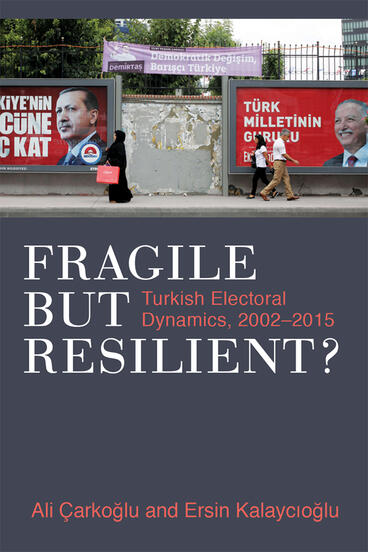Fragile but Resilient?
Turkish Electoral Dynamics, 2002-2015
Globalism has sharpened the urban/rural divide in 21st century Turkish elections
Description
Ersin Kalaycıoğlu and Ali Çarkoğlu, who conducted surveys comparable to the American National Election Survey for the 2002 and 2015 national elections in Turkey, chart the dynamics that brought the pro-Islamist conservative Justice and Development Party (Adalet ve Kalkınma Partisi-AKP) to power in 2002, and that continue to influence electoral politics. The authors trace the uneven course of democratization in Turkey, as revealed through elections, since the first competitive, multi-party elections in 1950. Since the market liberalization reforms of 1980, Turkey has been rapidly evolving from a closed, agricultural, comparatively underdeveloped polity into an open and industrial state primarily integrated with the global economy. Kalaycıoğlu and Çarkoğlu analyze different dimensions of five elections surveys in 2002-2015 period to show how the consequent socio-economic changes and traditional socio-cultural divisions have affected elections, political parties, and individual voters. The authors conclude that the historical-cultural divide between rural, peripheral, conservative groups and more urban, centrist, and modernized groups not only persists but shapes elections more than ever. This book not only provides an original comprehensive and critical evaluation of the Turkish electoral and party politics, it also offers a case study of voting behavior in a state undergoing both democratization and market liberalization in a rapidly changing and volatile international environment.
Ali Çarkoğlu is Professor of Political Science at Koç Üniversitesi
Ersin Kalaycıoğlu is Professor of Political Science at Sabancı University
Reviews
"This book is a must-read for understanding the challenges facing democracy in Turkey. It is rich in empirical analysis of causal factors behind voter alignment, party strategies and tactics, and election outcomes with a focus on how the AKP rule affected democratic development. It is a welcome contribution to the discipline."
- Birol Yesilada, Portland State University
—Birol Yesilada, Portland State University

